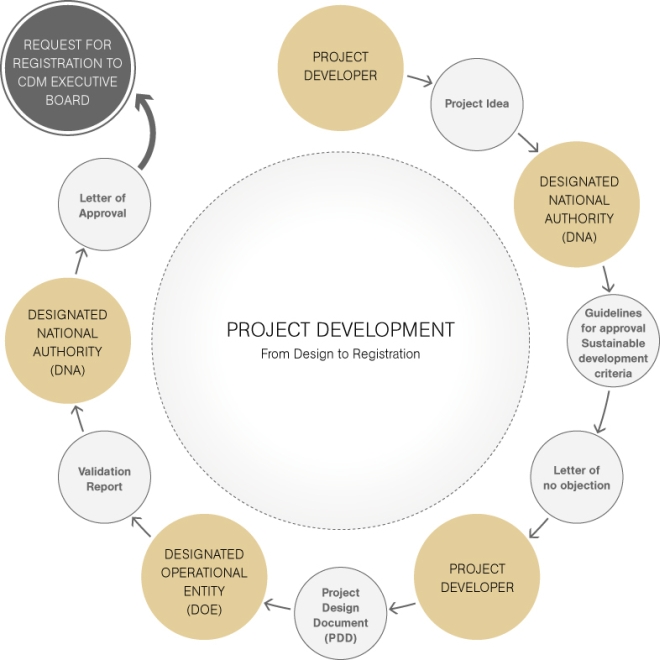Designated National Authorities
What is a designated national authority?
A designated national authority (DNA) is the organization granted responsibility by a Party to authorise and approve participation in CDM projects. Establishment of a DNA is one of the requirements for participation by a Party in the CDM.
The main task of the DNA is to assess potential CDM projects to determine whether they will assist the host country in achieving its sustainable development goals, and to provide a letter of approval to project participants in CDM projects. This letter of approval must confirm that the project activity contributes to sustainable development in the country, that the country has ratified the Kyoto Protocol, and that participation in CDM is voluntary. It is then submitted to CDM Executive Board to support the registration of the project.
See the diagramme
DNAs have additional roles to play, such as the submission of proposed standardized baselines for their country, among others. These responsibilities have increased as the CDM has evolved.
Find a designated national authority
If you are a DNA representative and your coordinates are incorrect or have changed,please send an email to moderator-dna@unfccc.int
Support for developing proposals for standardized baselines, microscale additionality and grid emission factors more»
How to submit proposed microscale renewable energy technologies for automatic additionality more» and step-by-step guide »
How to submit proposed standardized baselines more»
How to submit proposed Special Underdeveloped Zones (SUZs) for automatic additionality more»
NEW
DNA Chairing Committee

Mr. Muhammad Fawad Hayat from Pakistan (Left) was elected as the global DNA Forum Co-chair and Mr. Alan Ramirez from the Dominican Republic (Right) as the alternate global DNA Forum Co-chair from non-Annex I countries for 2022.
Full DNA Chairing Committee 2020
Full DNA Chairing Committee 2019
Call to DNAs to share local stakeholder consultation practices
As mandated by the CMP, the CDM Executive Board invites DNAs to provide to the UNFCCC secretariat information on practices conducted for local stakeholder consultations. Under the same mandate, DNAs who wish to develop guidelines for local stakeholder consultations in their countries can request technical assistance from the Secretariat. This CMP mandate aims at improving the transparency of the CDM and at helping DNAs put in place processes for complying with this important CDM requirement.
Shared DNA practices on local stakeholder consultations
Sustainable development guiding tools for DNAs
DNAs who wish to receive assistance in monitoring sustainable development benefits of CDM projects in their territory can submit a request to the UNFCCC secretariat. The CDM Executive Board has been mandated by a CMP decision to develop guiding tools for DNAs who might be interested in receiving such assistance. This mandate is expected to enhance transparency of the sustainable development aspect of the CDM.
DNAs who wish to benefit from the assistance available can submit a request via e-mail to moderator-dna@unfccc.int.
Call to DNAs to share their practices for monitoring sustainable development benefits of the CDM
With the aim to assist host parties in monitoring the sustainable development benefits of CDM project activities and PoAs on a voluntary basis, the UNFCCC secretariat would like to invite you to kindly share with us the practices that your DNA has in place for monitoring sustainable development benefits from CDM projects and PoAs, including the indicators used (if any). In case your DNA has not developed yet any provision in this regard, it would be also useful to inform us in order to have a better understanding of the present situation of all DNAs in relation to the monitoring practices of sustainable development benefits.
We invite you to share the provisions that your DNA has developed with regard to monitoring of sustainable development benefits from CDM projects and PoAs through the moderator email address: <Moderator-dna@unfccc.int> .




Offset now: visit the United Nations Carbon Offset Platform
Connect with us: